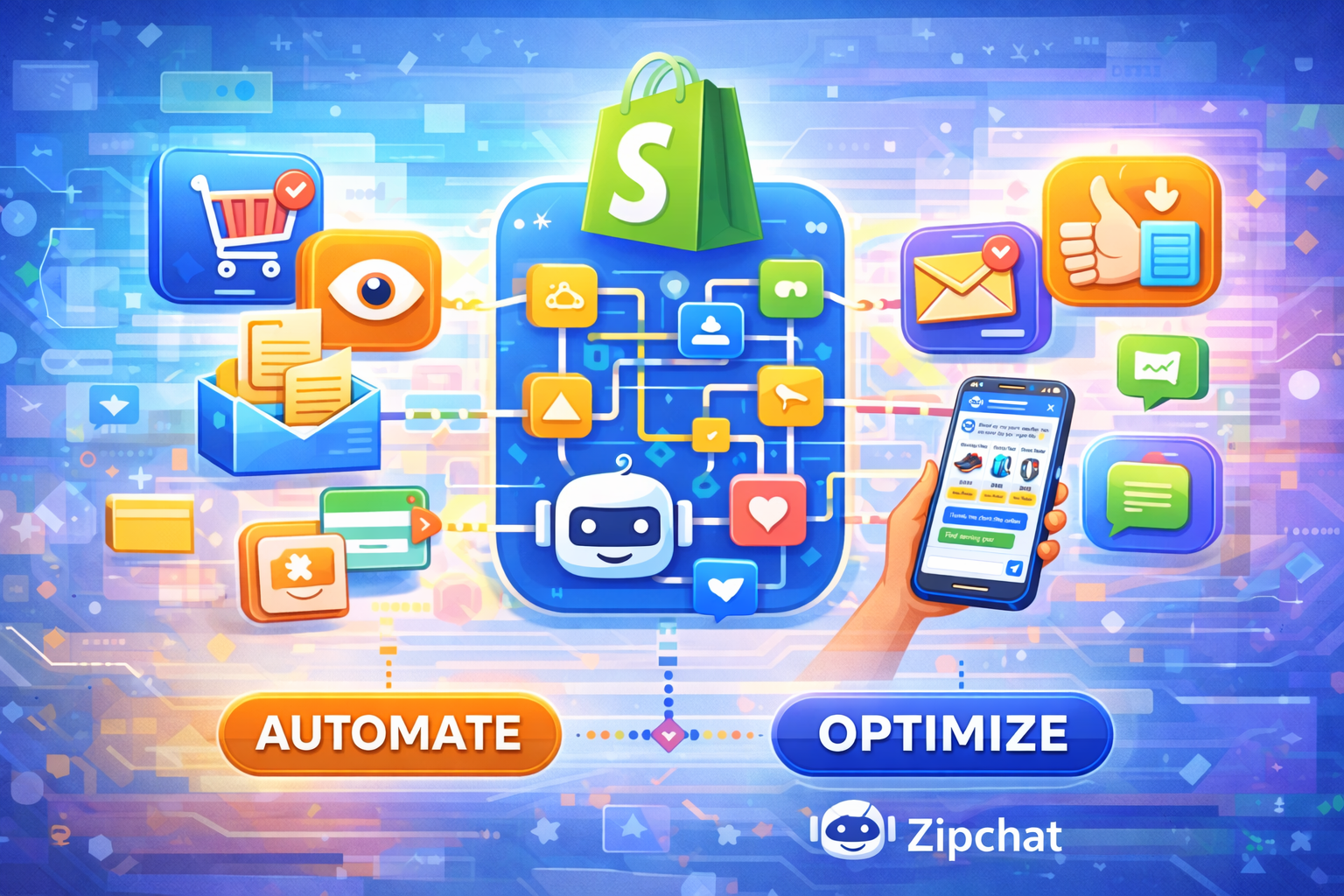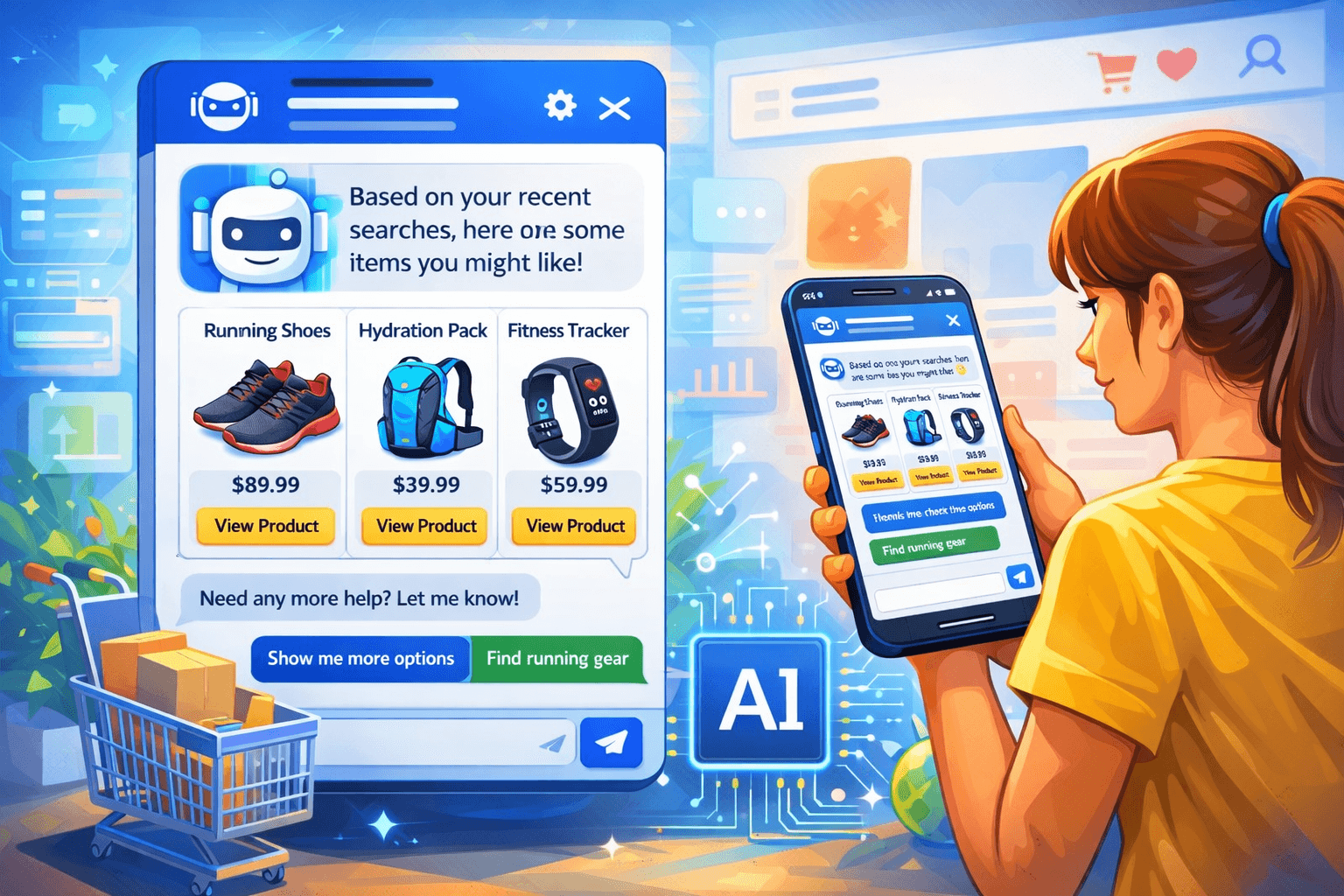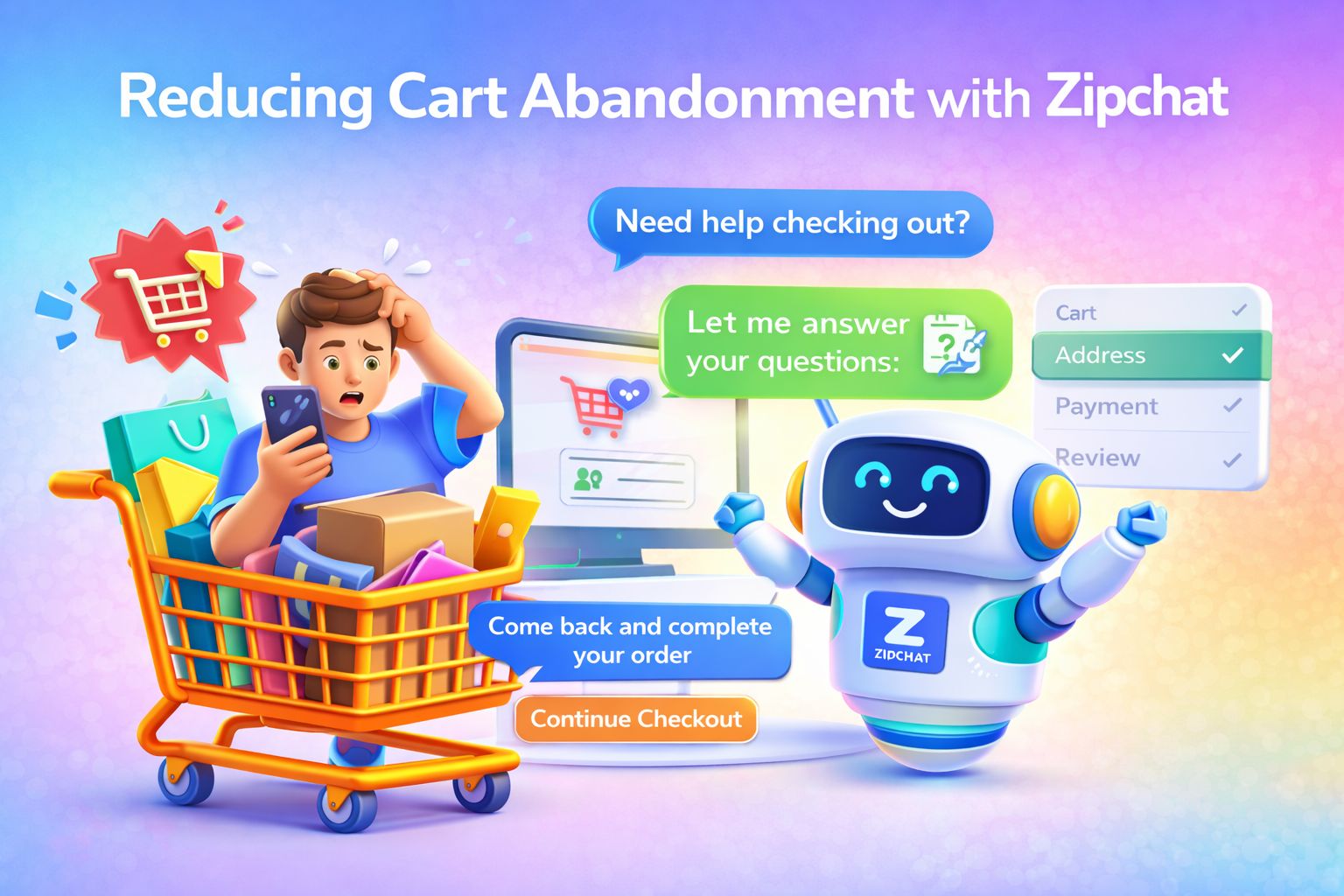Try Zipchat in Action!
Enter your store URL to see how Zipchat would behave.

Italy has witnessed a significant evolution in the realm of e-commerce in recent years. As the country's digital landscape continues to expand, the impact of artificial intelligence (AI) on online shopping has become increasingly evident. This article delves into the various facets of AI's influence on Italy's e-commerce sector and explores its transformative potential for the future.
E-commerce Evolution in Italy
Trends and Statistics
Italy, like many other nations, has experienced a steady growth in the field of e-commerce. According to recent data, the Italian e-commerce market has consistently expanded over the past decade, presenting immense opportunities for businesses. In 2020 alone, online sales in Italy reached a record high of €23.1 billion, representing a remarkable 26.7% increase compared to the previous year.

Moreover, the number of digital buyers in the country has been on a steady rise, with approximately 31.8 million Italians making online purchases in 2020. This figure is projected to reach 34.4 million by 2025, highlighting the evolving consumer behavior and the increasing adoption of digital platforms for shopping.
These statistics indicate not only the growing popularity of e-commerce in Italy but also the immense potential for AI-driven advancements to further enhance the online shopping experience for Italian consumers.
Key Players in the Italian E-commerce Market
Several key players have emerged in the Italian e-commerce market, revolutionizing the way people shop online. Companies such as Amazon Italy, eBay Italy, and Alibaba's AliExpress have gained significant traction, offering consumers a wide range of products and services.
Amazon Italy, in particular, has witnessed notable success, making it one of the leading e-commerce platforms in the country. With its vast product selection, efficient logistics, and personalized recommendations powered by AI, Amazon has cemented its position as a preferred online shopping destination for many Italians.
In addition to these global giants, there are also numerous homegrown e-commerce players that cater specifically to the local market, showcasing the diversity and competition within Italy's vibrant online retail sector.
One notable homegrown e-commerce player is YOOX NET-A-PORTER GROUP, an Italian online luxury fashion retailer. Founded in 2000, the company has become a prominent player in the global luxury e-commerce market. YOOX NET-A-PORTER GROUP offers a curated selection of high-end fashion brands, providing Italian consumers with access to exclusive and sought-after designer pieces.
Another noteworthy player in the Italian e-commerce scene is Eataly, an online marketplace that specializes in Italian food and beverages. Eataly not only offers a wide range of authentic Italian products but also promotes the country's culinary traditions and culture. With its emphasis on quality and sustainability, Eataly has gained a loyal customer base, both domestically and internationally.
Furthermore, the Italian e-commerce market has seen the rise of niche players catering to specific consumer needs. For example, Farmacia Loreto Gallo, an online pharmacy, provides Italians with a convenient way to purchase healthcare products and medications. The platform offers a vast selection of pharmaceutical items, ensuring that customers have access to essential healthcare products from the comfort of their homes.
Overall, the Italian e-commerce market is a dynamic and thriving industry, fueled by both global and local players. With the increasing adoption of digital platforms and advancements in technology, the future of e-commerce in Italy looks promising, offering endless possibilities for businesses and consumers alike.
AI-Commerce: Revolutionizing the Future of Online Shopping
How Artificial Intelligence is Reshaping E-commerce
The integration of AI technology in e-commerce has brought about a myriad of advancements, revolutionizing the way online shopping is conducted. Machine learning algorithms and data analysis have enabled retailers to gain valuable insights into consumer behavior, allowing for personalized product recommendations and targeted marketing strategies.
Furthermore, AI-powered chatbots have automated customer support, providing swift and efficient assistance to shoppers. These virtual assistants can quickly address customer queries, offer product recommendations, and even facilitate seamless transactions, enhancing the overall customer experience.
As AI continues to evolve, it is also being utilized in predictive analytics to forecast trends and optimize inventory management. By analyzing historical data and current market conditions, AI algorithms can help retailers anticipate demand, adjust pricing strategies, and streamline supply chain operations.
The Impact of AI on Customer Personalization
AI's influence on e-commerce goes beyond mere convenience. It has also revolutionized the concept of customer personalization. By leveraging vast amounts of data, AI algorithms can analyze customers' browsing history, purchase patterns, and preferences to provide tailored product suggestions and personalized offers.
This level of personalization not only enhances the shopping experience but also fosters customer loyalty and increases customer satisfaction. When shoppers feel understood and valued, they are more likely to become repeat customers, further driving the growth of e-commerce in Italy.
Moreover, AI-powered recommendation engines are transforming the way consumers discover new products. By analyzing user behavior and preferences, these algorithms can suggest relevant items that customers may not have otherwise come across, leading to increased cross-selling opportunities and higher conversion rates.
Enhancing Customer Experience with Virtual Assistants
The Role of Virtual Assistants in Improving Customer Satisfaction
Virtual assistants have become an integral part of the e-commerce landscape, playing a crucial role in enhancing customer satisfaction. These AI-driven helpers can provide real-time support, guiding customers through every step of their online shopping journey. From product inquiries to order tracking, virtual assistants ensure that customers' needs are met promptly and efficiently.

Moreover, virtual assistants have the ability to learn and adapt over time, becoming more attuned to individual customer preferences and offering personalized assistance. This level of responsiveness creates a sense of personalized service, replicating the experience one would have in a physical store and further solidifying customer loyalty.
Boosting Conversions Through Personalized Customer Interactions
A key advantage of AI-powered virtual assistants lies in their ability to engage with customers through personalized interactions. Through targeted messaging and tailored communication, these assistants can recommend products, offer exclusive promotions, and encourage customer engagement.
By leveraging customer data, virtual assistants can also predict customer preferences, making accurate suggestions that align with individual needs and increasing the likelihood of purchase. The power of personalized interactions not only boosts conversion rates but also establishes a lasting relationship between the customer and the brand.
Furthermore, virtual assistants can assist customers in post-purchase activities, such as providing information on product maintenance, troubleshooting common issues, and facilitating returns or exchanges. This comprehensive support ensures that customers feel supported even after completing their purchase, further enhancing their overall experience.
In addition to their role in e-commerce, virtual assistants are also making waves in other industries. For instance, in the healthcare sector, virtual assistants can provide patients with personalized medical advice, appointment scheduling, and medication reminders. This not only improves patient experience but also helps healthcare providers streamline their operations.
Another area where virtual assistants are making a significant impact is in the travel industry. These AI-powered helpers can assist travelers with itinerary planning, flight and hotel bookings, and even provide real-time updates on travel disruptions. By offering personalized recommendations and 24/7 support, virtual assistants contribute to a seamless and stress-free travel experience.
Navigating the AI-Driven Future of E-commerce
The Integration of AI in E-commerce Platforms
The future of e-commerce in Italy undoubtedly lies in the seamless integration of AI in online retail platforms. E-commerce companies are increasingly investing in AI technologies to optimize their operations, from inventory management to targeted marketing campaigns.

The incorporation of AI-driven tools and processes helps streamline business operations, improve efficiency, and deliver enhanced customer experiences. Through AI-powered analytics, retailers can anticipate trends, optimize pricing strategies, and ensure a seamless shopping journey for customers, thereby gaining a competitive edge in the market.
But what exactly does this integration of AI in e-commerce platforms look like? Let's delve deeper into some of the key AI technologies that are transforming the Italian online retail landscape.
One of the most notable AI technologies being adopted by e-commerce platforms is natural language processing (NLP). NLP enables computers to understand and interpret human language, allowing for more accurate and efficient search results. With NLP, customers can now enter complex queries or even speak naturally to find the products they are looking for, making the online shopping experience more intuitive and user-friendly.
Another exciting AI technology that is revolutionizing e-commerce is computer vision. With computer vision, retailers can analyze and interpret visual data, such as product images or videos, to extract valuable insights. This technology enables e-commerce platforms to automatically tag and categorize products, making it easier for customers to find what they are looking for. Additionally, computer vision can also be used to provide virtual try-on experiences, allowing customers to visualize how products will look on them before making a purchase.
Predictions for the Future of AI in Online Retail
Looking ahead, the future of AI in the Italian e-commerce landscape appears promising. With advancements in natural language processing and computer vision, AI technologies will continue to refine product search capabilities and further enhance customer personalization.
Additionally, the emergence of AI-powered voice assistants is set to redefine the way customers interact with online platforms. Voice-activated commands will enable users to conveniently shop, conduct product research, and make purchases, simplifying and expediting the online shopping process.
But AI's impact on the e-commerce sector goes beyond just convenience and personalization. It has the potential to drive economic growth and reshape the retail landscape as a whole. By automating repetitive tasks and optimizing operations, AI technologies can help businesses reduce costs and increase productivity. This, in turn, can lead to job creation and stimulate economic activity.
Moreover, the integration of AI in e-commerce platforms can boost consumer confidence. With AI-powered fraud detection systems, retailers can better protect customer data and prevent fraudulent activities, ensuring a secure and trustworthy online shopping experience. This increased trust in online transactions can encourage more consumers to embrace e-commerce, further fueling the growth of the industry.
In conclusion, the impact of AI on Italy's e-commerce sector is undeniable. From shaping the customer journey through personalized experiences to optimizing business operations, AI technologies have revolutionized the online shopping landscape. As Italy continues to embrace AI-driven advancements, the e-commerce industry is poised to thrive, offering unparalleled convenience and enhancing the overall shopping experience for Italian consumers. The integration of AI in e-commerce platforms will not only transform the way Italians shop online but also drive economic growth, boost consumer confidence, and reshape the retail landscape as a whole.
As we embrace the AI-driven future of e-commerce, it's clear that platforms like Zipchat AI are at the forefront of this revolution. Zipchat.ai, with its advanced AI-powered chatbot capabilities, is designed to enhance the online shopping experience for both businesses and consumers. By integrating seamlessly with Shopify, Zipchat AI offers real-time product suggestions, engages visitors with contextual conversations, and provides round-the-clock customer support—key components in reducing cart abandonment and boosting conversions. Whether you're looking to personalize your chat experience, gain valuable insights through conversation monitoring, or provide proactive support with multi-language options, Zipchat AI has a pricing plan tailored to your needs. Ready to transform your online retail business and elevate your customer experience? Install Zipchat AI on your Shopify today and step into the future of e-commerce with confidence.








